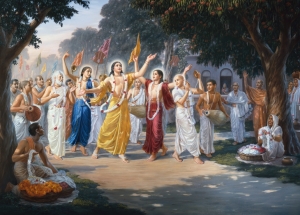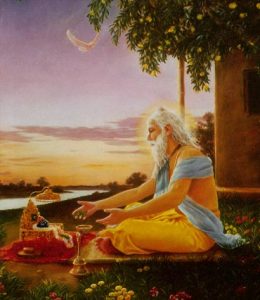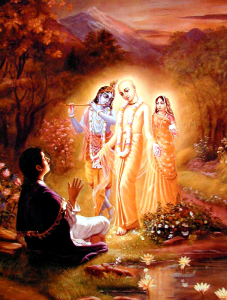Hare Krishna.
11th November, 2014. Gurgaon.
jaya jaya śrī-caitanya jaya nityānanda
jayādvaita-candra jaya gaura-bhakta-vṛnda
Question : What were the three external reasons for appearance of Sri Chaitanya Mahaprabhu ?
Ans: Srila Prabhupada writes in the summary of third chapter of Adi Lila :
The Supreme Personality of Godhead, Lord Śrī Kṛṣṇa, after displaying His pastimes as Lord Kṛṣṇa, thought it wise to make His advent in the form of a devotee to explain personally the transcendental mellows of reciprocal service and love exchanged between Himself and His servants, friends, parents and fiancīes. only Kṛṣṇa Himself can explain the confidential loving service performed in the four principal varieties of loving affairs between the Supreme Lord and His devotees. Lord Kṛṣṇa therefore personally appeared, with His plenary portions, as Lord Caitanya.
CC Ādi 3.13: Lord Kṛṣṇa enjoys His transcendental pastimes as long as He wishes, and then He disappears. After disappearing, however, He thinks thus:
CC Ādi 3.14: “For a long time I have not bestowed unalloyed loving service to Me upon the inhabitants of the world. Without such loving attachment, the existence of the material world is useless.
CC Ādi 3.15: “Everywhere in the world people worship Me according to scriptural injunctions. But simply by following such regulative principles one cannot attain the loving sentiments of the devotees in Vrajabhūmi.
CC Ādi 3.16: “Knowing My opulences, the whole world looks upon Me with awe and veneration. But devotion made feeble by such reverence does not attract Me.
CC Ādi 3.17: “By performing such regulated devotional service in awe and veneration, one may go to Vaikuṇṭha and attain the four kinds of liberation.
CC Ādi 3.26: “My plenary portions can establish the principles of religion for each age. No one but Me, however, can bestow the kind of loving service performed by the residents of Vraja.
CC Ādi 3.28: “Therefore in the company of My devotees I shall appear on earth and perform various colorful pastimes.”
CC Ādi 3.29: Thinking thus, the Personality of Godhead, Śrī Kṛṣṇa Himself, descended at Nadia early in the Age of Kali.
According to the Vedic literature, the foremost occupational duty for humanity in this Age of Kali is nāma-saṅkīrtana, or congregational chanting of the holy name of the Lord. Lord came as Yuga Avatara to inaugurate sankirtana movement.
CC Ādi 3.50: In Śrīmad-Bhāgavatam it is repeatedly and clearly said that the essence of religion in the Age of Kali is the chanting of the holy name of Kṛṣṇa.
CC Ādi 3.51: “O King, in this way people in Dvāpara-yuga worshiped the Lord of the universe. In Kali-yuga they also worship the Supreme Personality of Godhead by the regulations of the revealed scriptures. Kindly now hear of that from me.
CC Ādi 3.52: “In the Age of Kali, intelligent persons perform congregational chanting to worship the incarnation of Godhead who constantly sings the name of Kṛṣṇa. Although His complexion is not blackish, He is Kṛṣṇa Himself. He is accompanied by His associates, servants, weapons and confidential companions.”
CC Ādi 3.58: “By performing the sacrifice of congregational chanting of the holy name, learned scholars in the Age of Kali worship Lord Kṛṣṇa, who is now nonblackish because of the great upsurge of the feelings of Śrīmatī Rādhārāṇī. He is the only worshipable Deity for the paramahaṁsas, who have attained the highest stage of the fourth order [sannyāsa]. May that Supreme Personality of Godhead, Lord Caitanya, show us His great causeless mercy.”
Advaita Ācārya felt sorry for the condition of the world because even after Lord Kṛṣṇa’s appearance, no one had interest in devotional service to Kṛṣṇa. This forgetfulness was so overwhelming that Advaita Prabhu was convinced that no one but Lord Kṛṣṇa Himself could enlighten people about devotional service to the Supreme Lord. Therefore Advaita requested Lord Kṛṣṇa to appear as Lord Caitanya. Offering tulasī leaves and Ganges water, He cried for the Lord’s appearance. The Lord, being satisfied by His pure devotees, descends to satisfy them. As such, being pleased by Advaita Ācārya, Lord Caitanya appeared.
CC Ādi 3.96: Advaita Ācārya having appeared, He found the world devoid of devotional service to Śrī Kṛṣṇa because people were engrossed in material affairs.
CC Ādi 3.97: Everyone was engaged in material enjoyment, whether sinfully or virtuously. No one was interested in the transcendental service of the Lord, which can give total relief from the repetition of birth and death.
CC Ādi 3.98: Seeing the activities of the world, the Ācārya felt compassion and began to ponder how He could act for the people’s benefit.
CC Ādi 3.108: Thinking of the lotus feet of Śrī Kṛṣṇa, He constantly offered tulasī buds in water from the Ganges.
CC Ādi 3.109: He appealed to Śrī Kṛṣṇa with loud calls and thus made it possible for Kṛṣṇa to appear.
CC Ādi 3.110: Therefore the principal reason for Śrī Caitanya’s descent is this appeal by Advaita Ācārya. The Lord, the protector of religion, appears by the desire of His devotee.
Question : What were the three confidential reasons for appearance of Sri Chaitanya Mahaprabhu ?
Answer:
CC Ādi 4.230: Desiring to understand the glory of Rādhārāṇī’s love, the wonderful qualities in Him that She alone relishes through Her love, and the happiness She feels when She realizes the sweetness of His love, the Supreme Lord Hari, richly endowed with Her emotions, appeared from the womb of Śrīmatī Śacī-devī, as the moon appeared from the ocean.”
The first purpose was to relish the position of Śrīmatī Rādhārāṇī, who is the prime reciprocator of transcendental love of Śrī Kṛṣṇa. Lord Kṛṣṇa is the reservoir of transcendental loving transactions with Śrīmatī Rādhārāṇī. The subject of those loving transactions is the Lord Himself, and Rādhārāṇī is the object. Thus the subject, the Lord, wanted to relish the loving mellow in the position of the object, Rādhārāṇī.
The second reason for His appearance was to understand the transcendental mellow of Himself. Lord Kṛṣṇa is all sweetness. Rādhārāṇī’s attraction for Kṛṣṇa is sublime, and to experience that attraction and understand the transcendental sweetness of Himself, He accepted the mentality of Rādhārāṇī.
The third reason that Lord Caitanya appeared was to enjoy the bliss tasted by Rādhārāṇī. The Lord thought that undoubtedly Rādhārāṇī enjoyed His company and He enjoyed the company of Rādhārāṇī, but the exchange of transcendental mellow between the spiritual couple was more pleasing to Śrīmatī Rādhārāṇī than to Śrī Kṛṣṇa. Rādhārāṇī felt more transcendental pleasure in the company of Kṛṣṇa than He could understand without taking Her position, but for Śrī Kṛṣṇa to enjoy in the position of Śrīmatī Rādhārāṇī was impossible because that position was completely foreign to Him. Kṛṣṇa is the transcendental male, and Rādhārāṇī is the transcendental female. Therefore, to know the transcendental pleasure of loving Kṛṣṇa, Lord Kṛṣṇa Himself appeared as Lord Caitanya, accepting the emotions and bodily luster of Śrīmatī Rādhārāṇī.
Lord Caitanya appeared in order to fulfill these confidential desires, and also to preach the special significance of chanting Hare Kṛṣṇa, Hare Kṛṣṇa, Kṛṣṇa Kṛṣṇa, Hare Hare/ Hare Rāma, Hare Rāma, Rāma Rāma, Hare Hare and to answer the call of Advaita Prabhu. These were secondary reasons.
CC Ādi 4.238 — Once Lord Kṛṣṇa considered within His heart, “Everyone says that I am complete bliss, full of all rasas.
CC Ādi 4.239 — “All the world derives pleasure from Me. Is there anyone who can give Me pleasure?
CC Ādi 4.240 — “One who has a hundred times more qualities than Me could give pleasure to My mind.
CC Ādi 4.241 — “One more qualified than Me is impossible to find in the world. But in Rādhā alone I feel the presence of one who can give Me pleasure.
CC Ādi 4.242-243 — “Although My beauty defeats the beauty of ten million Cupids, although it is unequaled and unsurpassed, and although it gives pleasure to the three worlds, seeing Rādhārāṇī gives pleasure to My eyes.
CC Ādi 4.244 — “The vibration of My transcendental flute attracts the three worlds, but My ears are enchanted by the sweet words of Śrīmatī Rādhārāṇī.
CC Ādi 4.248 — “Thus although I am the source of happiness for the entire world, the beauty and attributes of Śrī Rādhikā are My life and soul.
CC Ādi 4.249 — “In this way My affectionate feelings for Śrīmatī Rādhārāṇī may be understood, but on analysis I find them contradictory.
CC Ādi 4.250 — “My eyes are fully satisfied when I look upon Śrīmatī Rādhārāṇī, but by looking upon Me, She becomes even more advanced in satisfaction.
CC Ādi 4.262 — “I am always eager to taste the joy that Rādhārāṇī derives from Me.
CC Ādi 4.263 — “In spite of various efforts, I have not been able to taste it. But My desire to relish that pleasure increases as I smell its sweetness.
CC Ādi 4.264 — “Formerly I appeared in the world to taste mellows, and I tasted the mellows of pure love in various ways.
CC Ādi 4.265 — “I taught devotional service that springs from the devotees’ spontaneous love by demonstrating it with My pastimes.
CC Ādi 4.266 — “But these three desires of Mine were not satisfied, for one cannot enjoy them in a contrary position.
CC Ādi 4.267 — “Unless I accept the luster of the ecstatic love of Śrī Rādhikā, these three desires cannot be fulfilled.
CC Ādi 4.268 — “Therefore, assuming Rādhārāṇī’s sentiments and bodily complexion, I shall descend to fulfill these three desires.”
CC Ādi 4.269 — In this way Lord Kṛṣṇa came to a decision. Simultaneously, the time came for the incarnation of the age.
CC Ādi 4.231 — All these conclusions are unfit to disclose in public. But if they are not disclosed, no one will understand them.
CC Ādi 4.232 — Therefore I shall mention them, revealing only their essence, so that loving devotees will understand them but fools will not.
All glories to Sri Guru and Gauranga.
All glories to Srila Prabhupada.




Comments
Hari Bol..
Radhe Radhe Jay Radhe.